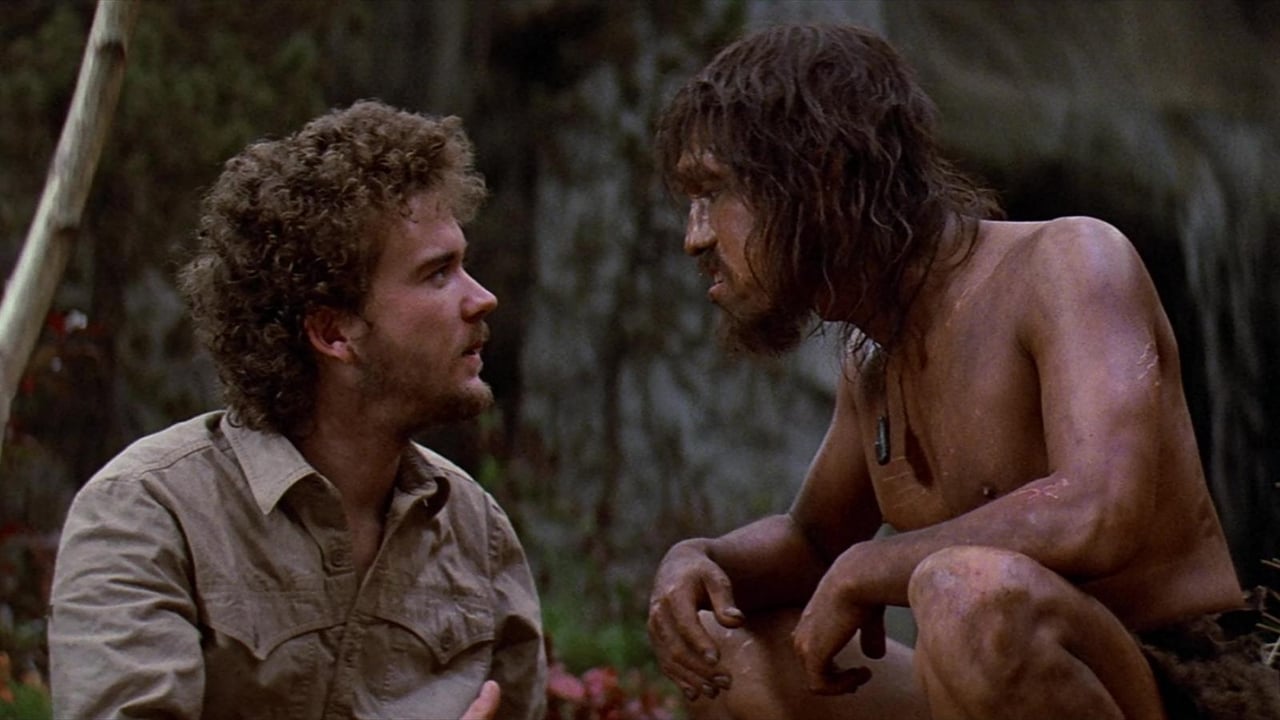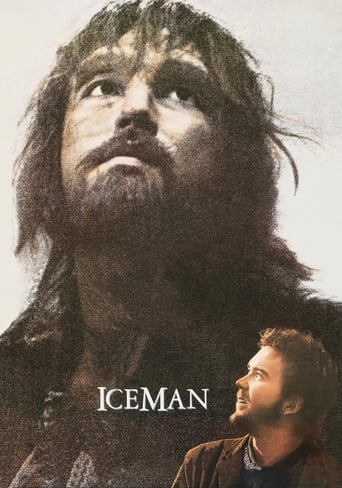



Load of rubbish!!
Just perfect...
An Exercise In Nonsense
This is ultimately a movie about the very bad things that can happen when we don't address our unease, when we just try to brush it off, whether that's to fit in or to preserve our self-image.
View MoreIf you can set aside the scientific implausibilities (or impossibilities) that abound in this movie, you can appreciate it from a number of angles. I first saw it many years ago and just watched it again - and still found it touching and relevant. Timothy Hutton starred as Sheppard - part of a scientific team in the Arctic who discover something frozen in the Arctic ice, and eventually discover that it's a Neanderthal who was somehow trapped there perhaps 40000 years ago. Intending to thaw him out and cut him up and ship various parts of his body around the world for study, the team is shocked when the Iceman comes to life. Played superbly by John Lone, the Iceman is alone, afraid and bewildered by the strange surroundings in which he finds himself, and the team basically continues to see him as a science project for lack of a better way to describe it - a specimen to be studied. But Sheppard sees him as a man and tries to understand him, communicate with him and befriend him. The interaction between the two came across as authentic, and the bond between them was believable. The viewer bonds with the Iceman too - or, if you don't, there's something wrong with you. The viewer starts to see him as a person; starts to sympathize with his plight. This is definitely a movie that pulls you in successfully.It's also a movie that - while dated in many ways - does have a strange relevance to today's world. We're not likely to ever find a frozen Neanderthal and bring him back to life. Even Otzi the Iceman (who was frozen in ice only 5000 years ago is most definitely dead and not coming back.) But there are scientists who think they can bring back extinct species like mammoths, and some speculation that eventually someone might try to bring back a Neanderthal (notwithstanding that most of us aside from Africans already have Neanderthal DNA in our bodies.) Watching this movie and thinking about that possibility - I started to wonder. Should we? Even if we could? What sort of life would we give to the poor creature? Would we treat it as a human, or would we treat it as a lab rat, subjecting it to never ending experiments and tests and studies? Would we be Sheppard - or would we be everybody else? I suspect I know the answer to that.Maybe it's best to leave the Neanderthals where they are - buried deep in our own DNA. (7/10)
View MoreA team of Artic researchers discover a caveman (beautifully played with touching depth, grace, and humanity by John Lone) who has been frozen in a glacier for 40,000 years and manage to revive him. Anthropologist Stanley Shepherd (an excellent and engaging performance by Timothy Hutton) befriends the caveman so he can learn all about his past while Dr. Diane Brady (a superb portrayal by Lindsay Crouse) and her surgical group want to figure out precisely how the caveman managed to survive for so long frozen in the ice. Director Fred Schepisi and screenwriters Chip Poser and John Drimmer treat the fascinating premise with refreshing and commendable restraint, compassion, and intelligence: This film thankfully eschews cheap thrills and fancy special effects to instead place a welcome and provocative emphasis on heartfelt and thoughtful drama as it explores the caveman's impossible predicament and desire to finish a spiritual quest he started thousands of years ago. Moreover, the characters of the researchers are especially well drawn as smart and capable professionals saddled with a daunting and unusual situation that they have no formal training on how to properly handle. But it's Lone's exceptionally expressive and convincing work as Charlie the caveman that makes this picture so special and captivating; Lone effortlessly pulls off the amazing feat of portraying this primitive man as a deeply sympathetic figure and even gives the Neanderthal a winning sense of gentle humor, as evidenced in the marvelously warm scene in which Charlie grunts along to Shepherd's a capella rendition of Neil Young's "Heart of Gold." Most importantly, Charlie is presented as a pitiable human being rather than a savage brute, which in turn gives this movie extra poignancy and resonance. The across the board fine acting by the top-rate cast helps a whole lot, with especially stand-out supporting contributions from Josef Sommer, David Straithairn, Danny Glover, and James Tolkan. Kudos are also in order for Ian Baker's gorgeous widescreen cinematography, Bruce Seaton's haunting score, and Michael Westmore's subtle make-up. Great touching ending, too. Highly recommended.
View MoreWhat makes this picture very enjoyable indeed is the expert direction of Fred Schepisi and a really fascinating performance by John Lone as a Neanderthal man marooned in the 20th Century.If you believe the high-tech medical mumbo-jumbo in which which Lone is "revived," I have a bridge I can sell you, but in spite of this nonsense the sequence works wonderfully through skillful direction and editing. Very suspenseful and full of wonder. You completely forget to ask what a fully equipped trauma team, on the order of what you might find at Mass General Hospital's ER, is doing in the middle of the Arctic.Or, for that matter, what an isolated Arctic outpost is doing with an elaborate vivarium replicating a forest environment.Nevertheless, the encounters in that simulated environment between Timothy Hutton and Lindsay Crouse, on the one hand, and John Lone are fascinating and completely credible. I fully believe that if a Neanderthaler could be revived, he could be like this. The exploration of his language and concepts was intelligent and fun to watch.There is one more bravura sequence worth mentioning--when John Lone escapes from the vivarium and finds himself in the totally artificial 20th Century world of the Arctic station. Wonderfully acted and edited. It forces us to see our world from an alien viewpoint.Far less convincing is the anthropological speculation that serves as a rationale for the Neanderthaler's wandering off into the Arctic snows. We are told that he is going on his "dreamwalk," but all I could see was that he was headed for certain death by exposure and should be stopped.Early on in the movie, the medical team's immediate response to the revival of the Neanderthaler was preposterous--they wanted to cut him up and study him. Bad Scientists! Good Cave Man! No responsible scientists or medical people would have acted this way. Faced with a living Neanderthal man, the obvious response would be to take him to an environment where he could feel unthreatened and reasonably at home while modern people learned about him, his language, his culture, and, yes, his physiology. All in all, the movie is so well made that you overlook the silliness of the "science" until afterward, when you've had a chance to think about it.
View MoreMan has always been curious about his origins and since the days of Darwin much effort have been done in tracing back the evolution of mankind to the final link where we as animals became self conscious and began advancing rapidly in terms of how much we have modified our macro biosphere in such short span of our existence.This movie is definitive in putting the viewers in a situation where we find that we have made it extremely difficult to see things in its simple state and rather complicate it with all our cynicism and rationality. Being modern humans we like to believe that as we have gained more cranial volumes, have become more intelligent but fail miserably in explaining and bridging the differences of a few thousand years. The sense that Shepherd starts to develop in spite of all his efforts that Charlie the caveman would never actually be able to adapt to this world is the realization that the film portrays.We find that with all our modern methods and abilities Shepherd does starts communicating to Charlie though in a vague way but still the actual situation could never be properly conveyed to Charlie. It's a classic example of generation gap where the newer generation wants to learn but fails to explain itself to older generation and the older generation is just afraid of the change. Moreover the surgical team is so mechanical that they just want to cut him up for analysis. They don't even consider Charlie a human but a relic, a living fossil.This film has taken much care in addressing the topic as it is quite believable movie for such an impossible plot. It could have turned out as a jerky and plastic movie if it was not treated well on scientific and performance aspects. I don't know how many people have watched this movie but I must say it is pretty engrossing. The portrayal of a confused, depressed and angry caveman in modern world by John lone is very convincing and touching as well. This can rank among some of the best sci-fi movies of its era.
View More